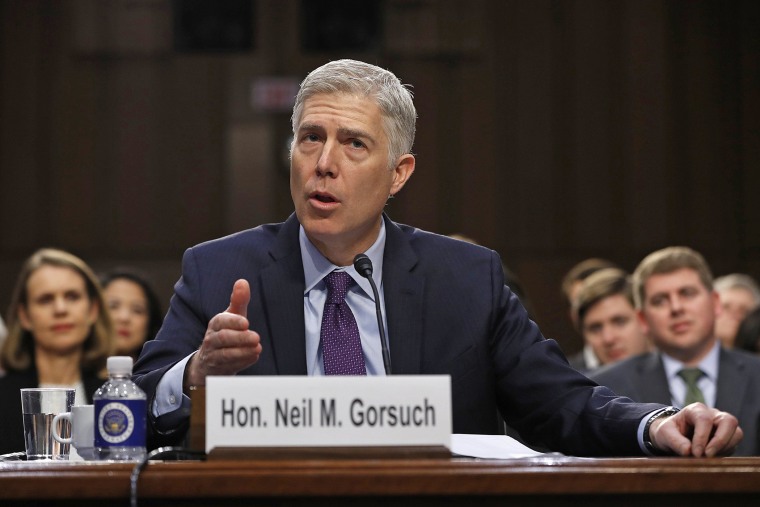When Judge Neil Gorsuch arrived in the Senate yesterday to begin his Supreme Court confirmation process, there was a little news before the nominee even sat down. Sen. Michael Bennet (D) of Gorsuch's home state of Colorado joined the nominee and graciously introduced him to the Senate Judiciary Committee.It's the sort of thing a senator ordinarily does when he or she supports a nomination, which meant Bennet was already undermining Democratic opposition to Donald Trump's high court nominee before the process had even begun in earnest.
Roll Call reported:
...Bennet did not say if he would support Gorsuch for the high court, telling the committee, "I am keeping an open mind on this nomination."His introduction did highlight what he saw as two clouds hanging over the proceedings, which the committee's Democrats also acknowledged. The first is the Republicans' refusal to hold a hearing or a vote on President Barack Obama's nominee to fill the vacancy, Judge Merrick Garland.Bennet said it was tempting to deny Gorsuch a fair hearing, but, "Two wrongs never make a right."
That's an interesting principle, actually. Under normal circumstances, it's fairly compelling to think powerful policymakers should act in a mature and responsible fashion, steering clear of pettiness and needlessly cheap efforts to score partisan points. Many understandably grow weary of "tit-for-tat" schemes.But I have a few straightforward follow-up questions for the Democratic senator: two wrongs may not make a right, but what does? Given the circumstances, what's just in this situation? How will rewarding Republican maximalist tactics move us any closer to what's "right"?As we
discussed when Gorsuch was first nominated, part of this fight has to do with the jurist's record and ideology, but just as important -- perhaps more so -- is the broader context.Over a year ago, President Obama chose a compromise nominee, Merrick Garland, to fill the Supreme Court's vacancy. The Senate Republican majority responded by launching a blockade without modern precedent: Garland, GOP senators declared, would not be considered in any way. No hearing, no debate, no floor vote, no consideration.As part of a scandalous display of obstructionism, Republicans blocked a qualified, compromise nominee because the president was a Democrat. To execute the gambit, GOP senators made up rules that didn't exist, they lied about rules that did exist, and when they assumed Americans would never actually elect Donald Trump to the presidency, they said they were prepared to leave the court's vacancy in place until 2021 -- at the earliest.In other words,
Republicans stole a Supreme Court seat, and now expect to be rewarded for it. GOP senators aren't just pretending the events of 2016 didn't happen, they're simultaneously insisting that the Senate play the game by the standard rules -- now that the people who set fire to the rule book are satisfied with their handiwork.The
New York Times' David Leonhardt's
assessment from several weeks ago is as correct now as it was then: "Democrats should not weigh this nomination the same way that they've weighed previous ones. This one is different. The presumption should be that Gorsuch does not deserve confirmation, because the process that led to his nomination was illegitimate."Michael Bennet seems eager to take the high road. His position is that Republicans were wrong in 2016 when they radically abused the process, so it's better that Democrats steer clear of their own obstructionism in 2017. And as nice as that may sound, it's an approach that carries its own dangers. Bennet's "Two wrongs never make a right" posture, while certainly polite, tells Republicans that there are no consequences for their actions. GOP senators stole a Supreme Court seat, and by playing nice, Dems would reward Republicans with the prize they sought -- at no price whatsoever.The precedent this would set creates a new set of incentives for senators going forward: you, too, can abuse the process in outrageous ways, get exactly what you want, and suffer literally no penalties.Something the
Washington Post's
E.J. Dionne Jr. wrote in early February -- long before Bennet's introduction of Gorsuch -- continues to ring true.
At least I understand Republican and conservative hypocrisy on this subject: They are focused on power and who will wield it. I find it harder to understand well-meaning people who were appalled by the hyper-politicization involved in the Garland blockade but now claim that an effort to stop Gorsuch's confirmation will only make matters worse.Worse? Really?If someone slugs you, should you be condemned if you defend yourself by swinging back? If a bully makes someone's life miserable, will taking him on and calling his bluff only make matters worse?Perhaps you think the above is hyperbolic, and I accept that my line of thinking won't appeal to pacifists. But if you are not a pacifist, ask yourself how this procedural extremism will be halted if one side is rewarded for violating all the conventions and rules of fair play and the other side just meekly goes along.
"The Rubicon," Dionne added, "was crossed with Garland."Republicans radically broke the rules last year. Democrats have to decide whether they're doing themselves, the country, or the political system any favors by pretending otherwise.
